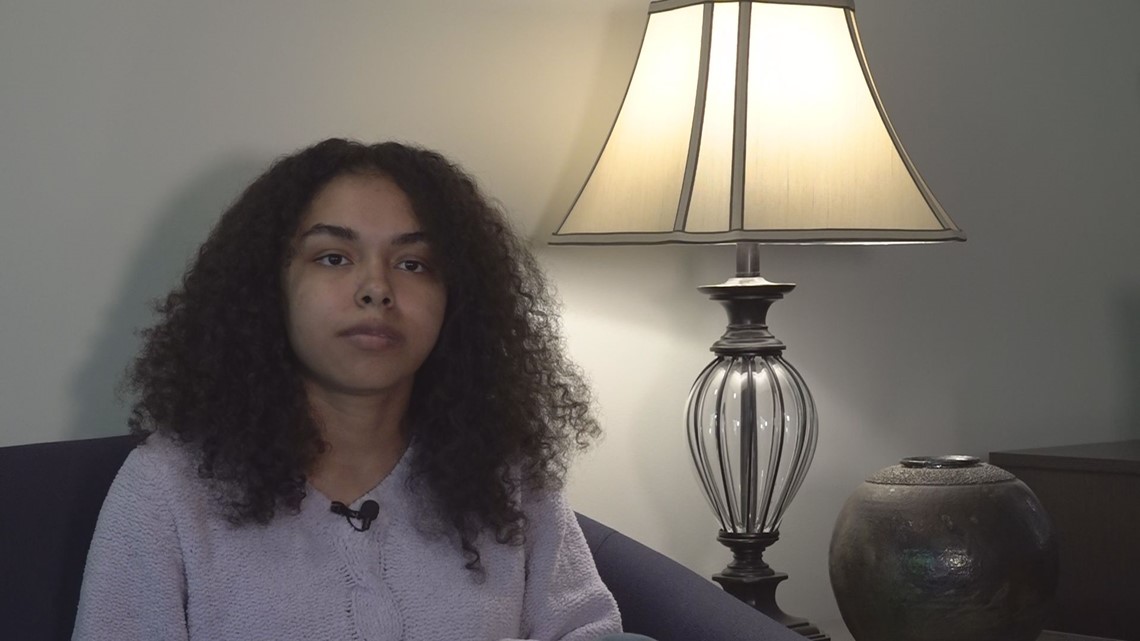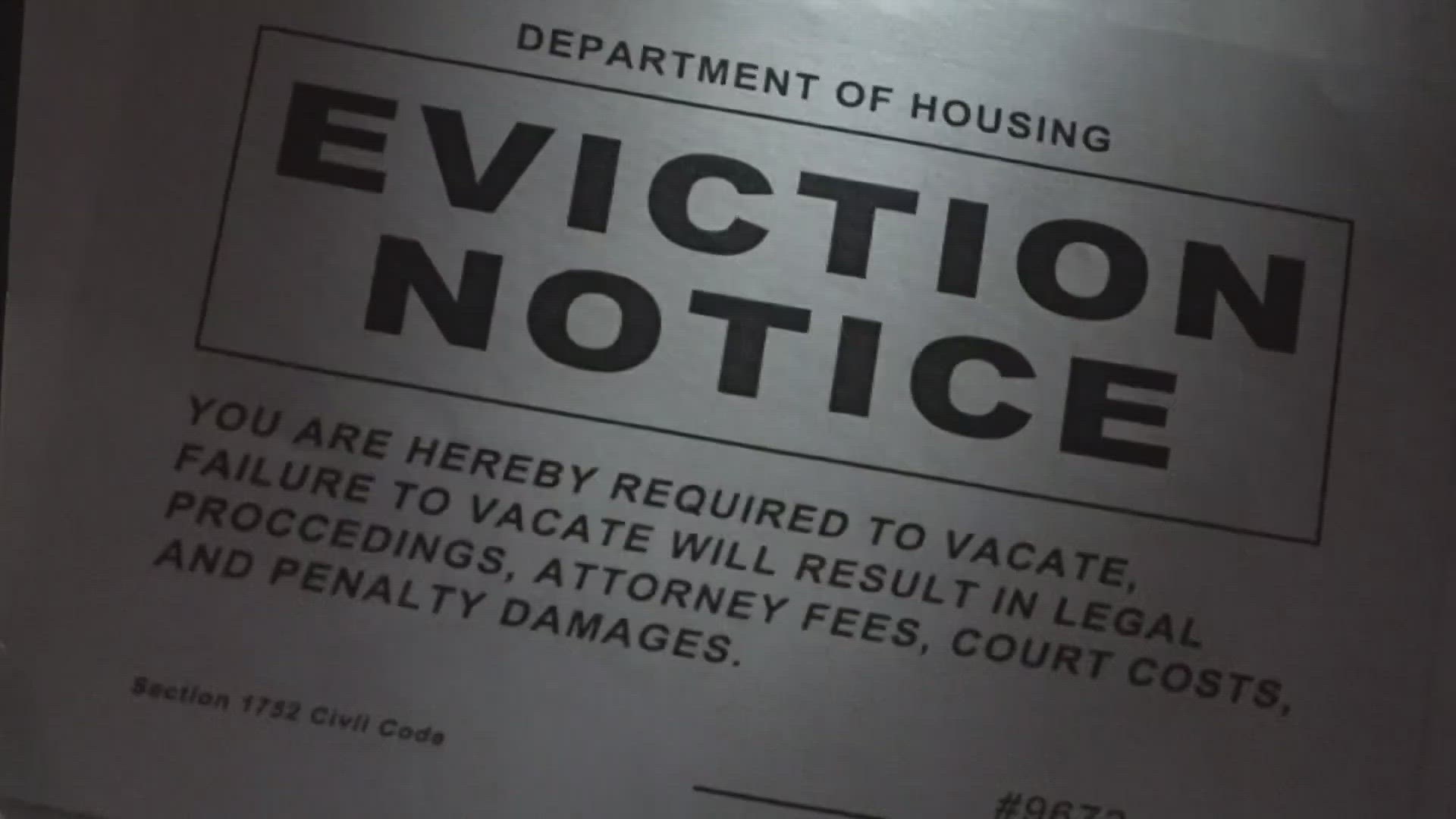KNOXVILLE, Tenn. — Over the last few years, many people have been playing catch up with rent.
As the pandemic exposed the lack of financial help across the country, it also revealed how housing can be a burden in some peoples' wallets—instead of a safe and cozy place.
Breyauna Holloway and her five children, who had to vacate their home in Knoxville at the end of 2022, know first-hand how hard it can be to find a new place to call home.
Holloway said she'd received six detainer warrants for eviction over the course of about 15 months. All of those warrants were for back rent that her prior landlord claimed she owed.
"They issued four to five of those as handled warrants while they were in possession of that COVID rent money that had been distributed by Knox County," Holloway said. "So, I was actually not behind rent. I was actually ahead on my rent."
Holloway lived in that home for about seven and a half years. She'd been struggling to pay rent, and on average, she was paying 50 to 60% of her income. When COVID hit and those rent funds became available, she utilized them.
After receiving the detainer warrant in December 2021, she said her first step was to contact the Knox County government, which had been issuing the rent funds. She wanted to make them aware of the situation and to find a solution as to how she could stay at her home while her landlord was in possession of that rent money.
"And during this time, I'm trying to scramble to find somewhere for me and my five children to go—that was affordable," Holloway said.
A report from the National Association of Realtors showed that rent growth in Knoxville grew faster than in any other U.S. city in 2022. Caught in a tough situation, Holloway reached out to Knoxville's Community Development Corporation housing for an emergency voucher.
"So many of the places that are considered affordable or government based, which you would apply through with KCDC, had waiting lists of between one and three years," Holloway said. "Which is clearly not feasible when you're being constantly chased down by process servers, being mailed eviction letters and being told that you have anywhere between 30 and 90 days to leave a property."


Knoxville's Community Development Corporation is one way to find affordable housing. It has public housing for Knoxville and Knox County and is recognized by the U.S. Department of Housing and Urban Development.
It manages and rents more than 3,700 units across more than 20 properties and deals with the application process and distribution of 4,000 Section 8 vouchers, according to KCDC's website.
Caitlandt Southhall, community engagement coordinator at Grow Partnership Tennessee under the CAC AmeriCorps program, said looking for affordable housing can be a huge challenge.
"There's a lot of problems within that," Southhall said. "Like with looking at assistance-based housing, like your KCDC housing where you can get in with a voucher when the process for getting a voucher is so lengthy, it can be a 12 to 18-month process, but depending on what your circumstance is, but if you were to lose that voucher, you're just done."


Initially, Holloway said they received some funding from members of the community and her church family. Once her story went public after the drag racing wreck on Magnolia, as her family was impacted by that as well, she also received help from American Red Cross.
This helped her pay for the first hotel she had to move in. When those funds ran out, she reached out to Knoxville-Knox County Community Action Committee.
The CAC program paid for the second hotel where she said they stayed for a total of two months. But she said when CAC ran out of funding for its hotel program, she was once again looking for housing to shelter her and her kids.
"Many of these hotels do not have full refrigerators or stove and oven access. So we have not been able to cook since mid-January when that wreck occurred," Holloway said. "So I've been using quite a few funds that I've been getting in to just feed us daily."
By the end of March, she said they had to leave that hotel. A private donor helped them settle into another hotel.
CAC isn't the only place to see an increase in need. 211 said calls spiked in 2020 at around 2,600. Last year, it answered around 1,800.
In the meantime, utilities nearly doubled and still remain high this year, according to 211.
With rent and utilities rising, many people are in a tough spot. Holloway's search for a home to shelter herself and her family has been like climbing an uphill rocky mountain.
"We were approved for a four-bedroom. But four bedrooms are scarce, and unfortunately, the rent amounts that the vouchers cover, do not match or exceed the amounts of rent that these property owners are charging," Holloway said. "My biggest fear is that we're not going to be able to afford to stay in a hotel before we can find permanent housing."
The Legal Battle Requires Knowing Tenant's Rights
As Holloway was referred to Legal Aid of East Tennessee, a free legal representation for tenants who may be facing issues with their landlords, she started realizing a few things.
"My landlord, under federal law was not allowed to issue any type of detainer warrants pertaining to eviction for 30 days until that federal rent money had been exhausted. And they repeatedly violated that federal allow," Holloway said. "I was also not made aware that my landlord had also violated state law by charging me exorbitant late fees."
Legal Aid said knowing your rights as a tenant is important. A landowner in Tennessee has the right to raise rent.
The problem right now, according to Legal Aid, is due to the shortage of affordable housing and the rapid unprecedented increase in rent in East Tennessee.
The housing crisis isn't only in this area; it has been a problem for the whole nation. It was going on before the pandemic but the pandemic made it worse, Legal Aid attorney Michael Davis said.
Davis has worked with people who haven't violated their lease but can't afford to live where they've been living for years.
"No one can plan for that, no one can work that into their budget. If they're used to spending a certain amount and it jumps that much that quickly," Davis said. "We don't have laws that strictly limit the notice period or the amount by which a landlord can raise rent. The general understanding is that it just has to be a reasonable amount or reasonable amount of notice."


Davis said being familiar with tenants' rights is important. Make sure you understand what your lease is, for example, if it's a month-to-month lease or if it's a year-to-year lease.
One of the most important steps is to get everything in writing.
Davis said they don't generally advise anybody to move in anywhere there's not a written lease. If you have a landlord that refuses to do that or refuses written communication, that can be a red flag.
Any requests that you make of the landlord, any responses that you get from the landlord, try your best to get those things in writing, especially rental receipts.
"But we also understand that due to the scarcity, people may have to accept something that is not ideal," Davis said. "They might have to move in somewhere where they don't get a written lease where the landlord is asking them for cash or is not giving a receipt. So, keep your own receipts, and keep written records of everything that you can with email communication."
One of the most important steps, Davis said, is to always pay your rent and make it your absolute top priority.
Some people are in a horrible position of having to pick and choose what bills to pay right now, but Davis said if at all possible, get that rent paid.
"Because losing your home is such a destabilizing thing, both for your health, for your work, or school or your kids," Davis said. "All it takes a lot of times is one month of missed rent for the landlord to legally start an eviction process."
If you do get a notice from your landlord that they plan to terminate your lease, or they plan to evict you, Davis said don't assume that's all it takes. You don't have to move out right away and you may have rights and defenses.


Talk with a lawyer, if you can, to see if you can legally defend that eviction. For example, Davis said if haven't paid rent and the landlord hasn't done maintenance, that could still be a problem for you. The landlord can still have a claim of non-payment of rent, which would probably result in eviction in court, Davis said.
"So always pay the rent unless a judge or your attorney tells you not to," Davis said. "Other things to know is the landlord can't just forcibly remove you if they haven't gone to court first. They can't just tell you that they're going to show up one day and start changing your locks or taking out your things or telling you you can't go back in. It has to go through the courts if you're still living there."
If someone qualifies to be a Legal Aid client, it is free. If they can't help, there may be some other help out there in the community.
Sometimes lawyers do want to help out on a case pro bono without charging their clients or maybe even charge a low fee. Davis said you can always reach out to law offices and ask whether they provide pro bono services.
Holloway said she was initially picked up by Legal Aid, yet, a letter sent out to her said they wouldn't be able to represent her.
WBIR reached out to Legal Aid for a comment:
"We are not able to comment on cases for former or current clients, or even confirm that an individual is or has been a client at LAET."
In the meantime, Holloway has been looking for housing, but a legal obstacle has been preventing her from finding it.
"When these landlords go to run a background check on me, they're going to see these five to six detainer warrants that my private landlord had taken out on me, and there's no way to remove them from my record. There's no expungements," Holloway said. "And even though they were dismissed, and they were illegal, they're still there."
A Petition Aims to Help Renters in East Tennessee
For those who are struggling to pay rent—a shelter is another option.
KARM said it's currently running at 90% capacity for women and about 80% for men. KARM also told WBIR it hasn’t turned anyone away who comes for help.
Adam Hughes, an East Tennessee organizer with Statewide Organizing for Community Empowerment, said there is a solution to the housing crisis here in Knoxville. A petition is requesting access to legal services for Knox County renters.
"I think one important thing that we could do is simply to guarantee every single tenant facing eviction has the right to legal counsel," Hughes said. "When we're looking at people who might be losing their house, losing their standard of living, because that's a civil case, you don't automatically get a lawyer appointed to you."


Nashville has adopted the Eviction Right to Counsel program, and Hughes said the easiest way to prevent an eviction is to get to someone before it becomes an acute problem.
If there can be interventions and support coming to tenants before it becomes a problem, it also saves the landlord from having to go through the eviction process. By getting those resources to tenants, they can keep paying their rent.
Hughes said his hope is for the community to become stronger and more engaged in finding housing solutions.
"I think my biggest fear is that this city is transformed to the point of unrecognizability," Hughes said, "I see right now when you look at the rates of eviction in East Knoxville, and you look at the way, when you come up at Magnolia, some of those neighborhoods might change. I think there's a very real future where entire neighborhoods are gentrified to the point of unrecognized ability. And the people who have lived there for generations are no longer able to afford to live there."

